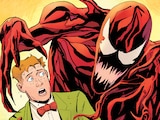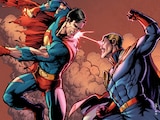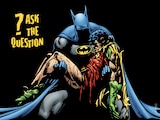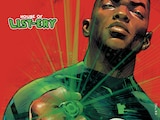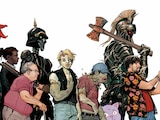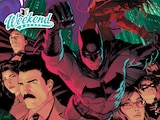Matt Reeves’ The Batman offers a fresh perspective on the Dark Knight, with many elements reimagined or portrayed differently than we might be accustomed to seeing. One of these which hasn’t been spoken about much is Bruce Wayne and Alfred Pennyworth’s relationship. The intimacy and affection we’re used to between them is almost completely absent from Reeves and Peter Craig’s script. It’s clear the two love one another, but it’s easy to be taken aback by how Bruce treats Alfred. It’s a very nuanced relationship, which goes on an interesting emotional arc during the course of the film.
So, why does Bruce and Alfred’s relationship feel so different in this movie? This version of the butler clearly takes a more tough love approach, but we’ve seen that before. It’s in the Geoff Johns and Gary Frank graphic novel Batman: Earth One and in Sean Pertwee and David Mazouz’s portrayals on TV’s Gotham. But there seems to be more of a distance between Robert Pattinson’s Bruce Wayne and Andy Serkis’s Alfred Pennyworth.

One reason is that we’re used to seeing an Alfred that operates as mission control for Batman. Remember Jeremy Irons in Batman v Superman: Dawn of Justice and Justice League? He was communicating with Batman during his patrols, always up to date on all the action. In The Batman, Alfred informs Bruce of Mayor Mitchell’s murder and is surprised to learn that Batman has already investigated the crime scene.
Not only is Alfred not there with Bruce on his missions—he’s barely there in the movie! Alfred appears in only a handful of scenes throughout The Batman and is completely absent for the film’s final 54 minutes. Yet despite this, Alfred makes the most of his time on screen, and Serkis gives one of the most impactful performances of his live-action career.
The distance between Bruce and Alfred can also be attributed to Batman’s state of mind in The Batman. He seems to be rejecting his life as Bruce Wayne, retreating from the public eye and avoiding meetings with businessmen. Alfred represents his past as Bruce Wayne, and at this point in his life, Batman is embracing vengeance and rejecting his humanity. This evolves as the film progresses, and by the climax Bruce has embraced hope.

In some ways, Bruce seems to be rejecting Alfred as a father figure. There are a few moments in the movie where he almost seems cruel to Alfred. At one point, Bruce coldly tells Alfred that he isn’t his father, and in another scene, he asks Alfred why he has Wayne cufflinks if he isn’t a member of the family. When Alfred awakens from his coma, the first thing Bruce says is, “You lied to me.”
Their relationship is a bit colder than usual, but then again, we’re used to seeing their intimate father/son bond and that’s not here yet. If we didn’t have decades of media to compare this to, would Alfred and Bruce’s relationship still seem stand-offish? Plus, it’s not like there’s no precedent.
When Alfred first appeared in 1943’s Batman #16, Bruce barely tolerated his presence. In 1944’s Batman #22, Bruce and Dick gave Alfred a hard time about his job performance and made fun of him behind his back. In 1949’s Batman #52, the Dark Knight had Alfred take the fall for Bruce Wayne’s apparent murder and the butler was temporarily imprisoned. In 1951’s Batman #68, Bruce cruelly fired Alfred as part of a ploy to capture some criminals, but he didn’t tell the butler that the firing was fake.

Bruce’s relationship with Alfred improved over time, but it would still be years before he became mission control for Batman and a father figure for Bruce. When Dick Grayson left Wayne Manor to attend Hudson University in Batman #217, the dynamic between the Wayne heir and his butler began to change. Alfred became the sole person in Batman’s home who knew his secret and the primary person for Bruce to share information with. This evolved further after Crisis on Infinite Earths rewrote Batman’s history. Now Alfred had been a part of Bruce’s life since before his parents died, changing him from a peer to family.
Of course, the flip side to being a father figure is that relationships with fathers and sons can be rocky, and that’s what we see in The Batman. During the hospital scene, Bruce gives us some insight that explains his cold treatment of Alfred: “I never thought I’d feel fear like that again,” he says. “I thought I’d mastered all that. I mean, I’m not afraid to die. I realize now there’s something I haven’t got past. This fear of ever going through any of that again. Of losing somebody I care about.”
It’s a powerful moment that Robert Pattinson knocks out of the park. It’s suddenly made clear that Bruce has been pushing Alfred away out of fear. He’s shut Alfred out because he’s afraid of losing him. Bruce’s cold treatment of Alfred wasn’t because he didn’t care, it was because he loved him so much that it frightened him. Bruce’s confession hits harder because it immediately follows Alfred opening up about his insecurities about being a parent: “You were only a boy Bruce,” Alfred laments. “I could see the fear in your eyes, but I didn’t know how to help. I could teach you how to fight, but I wasn’t equipped to take care of you. You needed a father, and all you had was me.”

This moment of vulnerability is all too real for any father who has ever doubted themselves as a parent. Bruce and Alfred take one another’s hand and silently comfort one each other. No words are spoken because none are needed.
Some have pointed out that The Batman is about the Dark Knight learning to be a hero and stumbling along the way. But after a few rewatches, I would argue that it’s also about Bruce and Alfred learning to be father and son, and all the challenges that go with that.
The Batman, directed by Matt Reeves and starring Robert Pattinson as Batman and Andy Serkis as Alfred Pennyworth, is now in theaters and streaming on HBO Max. Not yet a subscriber? Sign up today to enjoy the best in DC movies and TV.
Joshua Lapin-Bertone writes about TV, movies and comics for DCComics.com, is a regular contributor to the Couch Club and writes our monthly Batman column, "Gotham Gazette." Follow him on Twitter at @TBUJosh.
NOTE: The views and opinions expressed in this feature are solely those of Joshua Lapin-Bertone and do not necessarily reflect those of DC Entertainment or Warner Bros.




